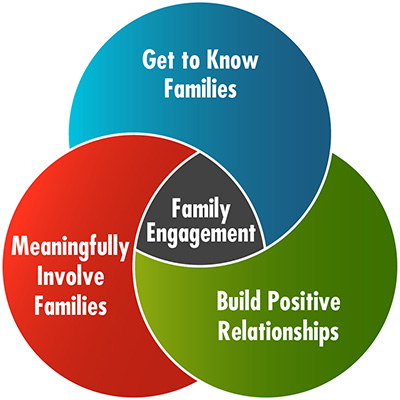What do educators need to understand about families of children with disabilities?
Page 1: The Importance of Family Engagement
 In the social and academic development of children, both educators and families play integral and overlapping roles. When families and schools work together to help children grow in these areas, they are more likely to be successful. Family engagement is a practice in which families* and school personnel collaborate to support and improve the learning and development of children. Sometimes, this practice is referred to as parent engagement, parent involvement, or family-school partnership.
In the social and academic development of children, both educators and families play integral and overlapping roles. When families and schools work together to help children grow in these areas, they are more likely to be successful. Family engagement is a practice in which families* and school personnel collaborate to support and improve the learning and development of children. Sometimes, this practice is referred to as parent engagement, parent involvement, or family-school partnership.
But family engagement means more than simply informing parents about their child’s progress or challenges, where communication is primarily one-way—that is, from the teacher to the parent. Rather, family engagement happens when educators actively encourage families to participate in meaningful ways, and families support their children at home as well as at school. This establishes a mutually beneficial relationship, one in which educators are committed to listening and collaborating with families and families are committed to prioritizing their children’s education. This relationship between schools and families is:
- Centered around student development and learning
- Reciprocal, in that both schools and families benefit from it
- Developed through trust and respect
- Ongoing, in that it carries on throughout a child’s entire time in school
*Families are defined in a number of ways and may include biological parents, stepparents, and adoptive parents. This includes anyone serving in place of a biological parent, such as other family members (e.g., grandparents, aunts, uncles, siblings, cousins), guardians, foster parents, or court-appointed surrogate parents. For some, the extended family may comprise neighbors, clergy, community leaders, or anyone actively involved in caring for the child.
Research Shows
Family engagement is regarded as a best practice in education. Decades of research has shown that parent involvement is a powerful influence on children’s educational success. More specifically, when families are involved in their child’s education, data indicate:
- Increased student achievement (Park & Holloway, 2017; Jeynes, 2005)
- Improved attendance and behavior (Smith, Reinke, Herman, & Huang, 2019; Sheldon, 2007; Nokali, Bachman, & Vortruba-Drzal, 2010)
- Improved social-emotional skills (Smith, Sheridan, Kim, Park, & Beretvas, 2020; Van Voorhis, Maier, Epstein, & Lloyd, 2013)
- Increased graduation rates (Ross, 2016; Hoover-Dempsey, Walker, Sandler, Whetsel, Wilkins, & Closson, 2005)
 Effective family engagement doesn’t happen overnight. It requires thoughtful planning and takes time and effort to develop and maintain. Further, the practices associated with family engagement may be unique to different schools or families. That said, in order to engage families, educators generally must:
Effective family engagement doesn’t happen overnight. It requires thoughtful planning and takes time and effort to develop and maintain. Further, the practices associated with family engagement may be unique to different schools or families. That said, in order to engage families, educators generally must:
- Get to know families. This includes their family composition, challenges, and experiences.
- Build positive relationships. This entails establishing trust and mutual respect.
- Meaningfully involve families. This means actively creating opportunities for parents to collaborate with educators.
For Your Information
Because parental engagement has demonstrated many significant benefits, federal law encourages schools to implement the practice.
Every Student Succeeds Act (ESSA): Requires schools to meaningfully engage the parents of all students and ensure that they are given input and influence in decision-making.
Individuals with Disabilities Education Act (IDEA): Requires that the parents of students with disabilities are full and equal participants with school personnel on their child’s individualized education program (IEP) team.
Every Student Succeeds Act (ESSA)
Federal education law originally enacted in 1965 as the Elementary and Secondary Education Act (ESEA). This law now mandates the use of academic and behavioral evidence-based practices. When this act was reauthorized in 2001, it was referred to as the No Child Left Behind Act (NCLB). The Every Student Succeeds Act (ESSA) reauthorized the Elementary and Secondary Education Act in 2015 and went into effect in the 2017–2018 school year.
Individuals with Disabilities Education Act (IDEA)
Name given in 1990 to the Education for All Handicapped Children Act (EHA) and used for all reauthorizations of the law that guarantees students with disabilities the right to a free appropriate public education in the least-restrictive environment.
individualized education program (IEP) team
IEP – A written plan, required by IDEA and used to delineate an individual student’s current level of development and his or her learning goals, as well as to specify any accommodations, modifications, and related services that a student might need to attend school and maximize his or her learning.
IEP team – The multidisciplinary team of education and related services professionals that develops and evaluates, along with the students and their parents, the individualized education program plan for each student with a disability.
On the following pages, we will focus on getting to know the families of students with disabilities and the challenges they face. Specifically, these pages will discuss:
- Emotional reactions to disabilities
- Additional roles of families
- Stressors of daily living